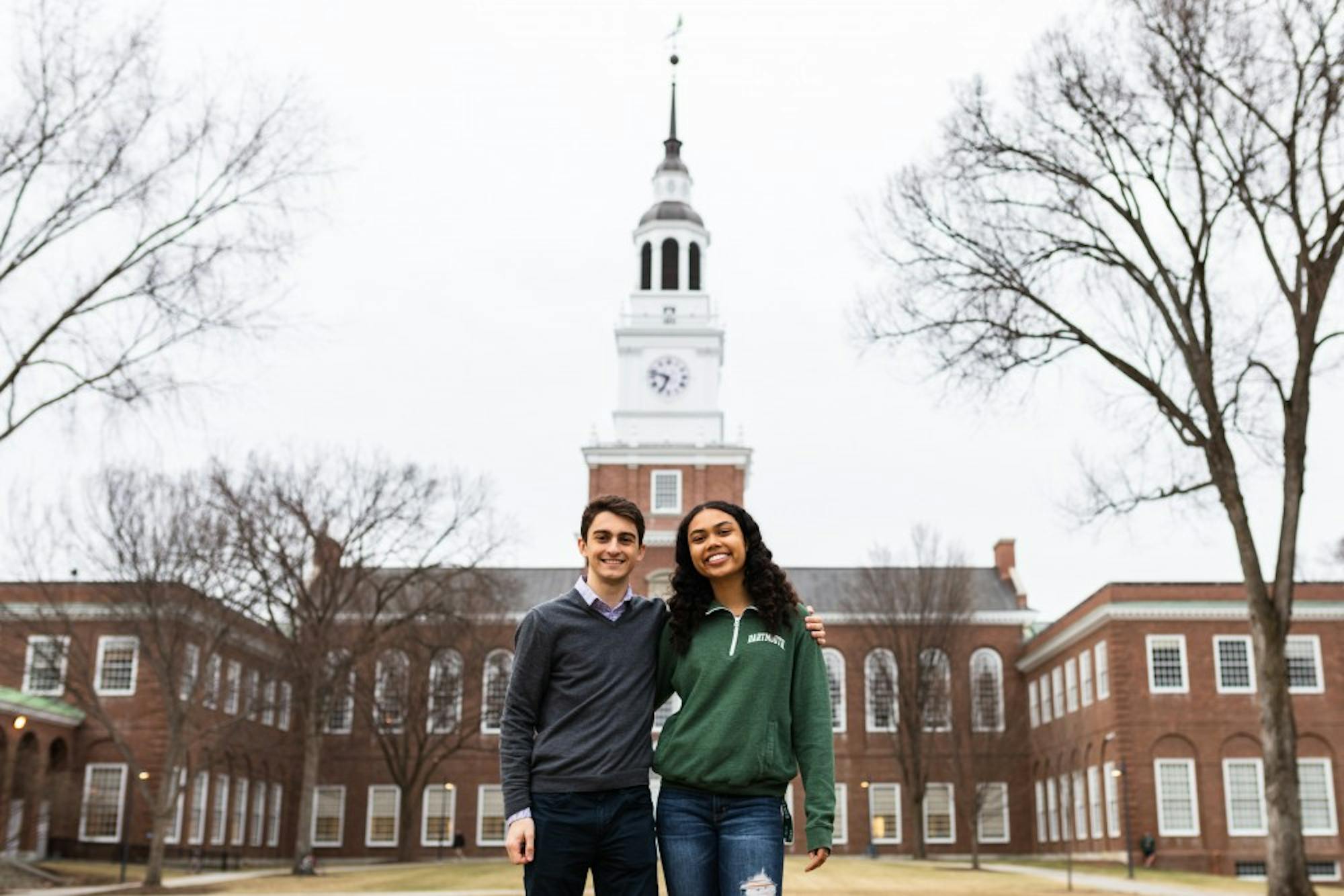In April, Luke Cuomo ’20 and Ariela Kovary ’20 were elected as Student Assembly president and vice president, respectively. They ran on a campaign that advocated for the creation of a unified sexual misconduct policy, subsidized bus tickets for the Dartmouth Coach, and increasing the value of Dartmouth Dining Services’ meal swipes. They said that this summer they have begun laying the groundwork for creating a central network for class syllabi and organizing an orientation session for incoming freshmen to learn more about how to get involved in Student Assembly.
The Dartmouth sat down with to Cuomo and Kovary to discuss why they chose to run, their advice to incoming freshmen and the issues they are interested in addressing once in office, including making Student Assembly work more visible on campus and integrating the house system governments and the Student Assembly senators.
What motivated you to run for Student Assembly president and vice president?
LC: I had done Student Assembly for my first three years at Dartmouth, and when the opportunity presented itself, I figured I had the experience and a lot of ideas. There were a lot of issues I wanted to tackle, and running for Student Assembly president seemed like my best chance to make some sort of impact on campus before I left.
AK: Going into my senior year got me thinking about how I could go out with a bang, but also about whether I was doing the most I could to give back to the community in some shape and form. It is super exciting to know that whatever changes or programs we implement will benefit the entire student body.
Only about 1,850 votes were cast during the last election. Do you think this is an indication of student apathy? If so, how do you hope to combat this?
LC: Voter turnout was actually relatively high even though it was below 50 percent. When you look at the other Ivies, Dartmouth is in the top half in terms of votes, and I think in this election there was quite a bit of involvement from the student body. There is certainly some apathy and disinterest among portions of the student body, but I think that’s natural in any case. If you look at national politics, we can barely crack 60 percent participation in the presidential election, so it’s not dire. Obviously, I would love to have more involvement.
During my term, being more visible on campus, talking with people, working with different communities on campus and showing people that we are making progress on changes will be the only way we can combat apathy. The Elections Planning and Advisory Committee has revised campaigning rules for next election so that the campaign is now longer by about a week or so, and this will give students a better chance to engage with the candidates, the platforms and will hopefully help with the apathy issue.
AK: The way to combat these numbers is to get people involved in what we’re doing. Because we only have a week to campaign, it is hard for students to learn about everyone’s platforms in meaningful ways. But now, we’re in office, and it’s more than a fleeting thing that happened spring term. Next year, we want to see actual engagement all across the board.
Are there specific initiatives from the previous Student Assembly leadership that you are hoping to continue, and is there anything you want to change?
LC: One of their most impactful projects was the Dartmouth Coach and Co-op voucher program, from my observation. We are going to be working on streamlining it, hopefully, and moving it off Student Assembly’s books — creating an institutional home for it in the College. The previous Student Assembly was very good at increasing their visibility on campus by hosting regular office hours and communicating through blitzes. There is nothing major I want to change about the way previous SA president Monik Walters ’19 and previous SA vice president Nicole Knape ’19 ran things. There are some streamlining and constitutional tweaks that need to be done, but mostly we want to build on what they did and not erase it.
AK: We definitely want to continue putting more funding towards the take a professor out to lunch initiative, because that’s come to serve as a vital gateway to connecting students to their teachers or to potential mentors outside of the classroom. It has helped with outside-of-class engagement and understanding that your professor’s a real person too. You actually get to know them and what their interests are. They can give you advice on anything, and it doesn’t have to be academic. In terms of our relationship with the administration, there’s more to develop. I want to be on a “dap up” basis with President Hanlon, but we will see if that will come in due time.
In March, when the College released a draft of the its new Unified Sexual Misconduct Policy and Procedures, some members of the student body expressed concern that they were not given the opportunity to adequately offer feedback. How is SA working with the administration to ensure that the new policies reduce sexual assault and address sexual violence awareness on campus?
LC: The only way I can really have an impact on these College policies, which are mainly written behind closed doors by lawyers with foremost legal implications, is by having a good relationship with College leaders, like President Phil Hanlon and dean of the College Kathryn Lively. People complain or claim that there wasn’t enough student input, and that’s a valid concern, because sometimes we feel like the College isn’t really listening to us — and to an extent, I would agree with that. But we also have to recognize that there’s a lot of different things that need to be taken into account, one of which is the voice of the student body.
I’ve already actually set up some meetings with different groups on campus who are looking to have a meeting with President Hanlon and Dean Lively. We’re in the process of bridging that gap between the administration and the students. That’s how I think I can best impact policy.
AK: We’ve created initiatives, like clubs and even exterior entities such as WISE, and then at the College we have learning programs, including Movement Against Violence and the Student and Presidential Committee on Sexual Assault. If we’re not connecting all of them together, then it’s like we’re all trying to battle this one problem but not as a united front. If students have specific things they want to say about policies, we’re definitely open to hearing it and we’ll show them who to talk to.
The College introduced the House system in 2016 with hopes that it would become a key source of community. How does SA plan to improve the housing communities and encourage students to get involved in its activities?
LC: The Student Assembly Senate is an institution that only has existed for three years. The government of the house system has really evolved a lot in the last three years. It’s been a little difficult to keep track of where the power is and where the money’s flowing, so that’s something we’re trying to keep up with. One of the things I’ve talked with several of our Student Assembly senators who are really involved in the house system is integrating the house government and the Student Assembly government. People get super confused with that during the elections, so we basically want to clarify the demarcation between the two but also ensure that there’s more coordination between them.
AK: The house system is fairly new, so it is clear that the impact it will have in the future will be different. Identity and pride needs to form around the houses. Being in a house, so far, serves the function of sorting students into dorms for four years, and so people are critical of the quality of the dorm and how they can’t live with their friends. But it’s a chance to make new friends through this random assortment. I don’t expect the incoming class to necessarily adopt the house system, but if the College keeps funding it and having full belief in it, the system will kick off.
What advice do you have for incoming freshmen?
LC: Don’t be afraid to get to know upperclassmen. They can email me as student body president, and I would be happy to help. There are so many upperclassmen who would be overjoyed to impart their wisdom and experience to a freshman. I think freshmen should be aggressive. They shouldn’t burn themselves out, but they should really pursue a lot of new opportunities. There’s so much on campus that they probably never had in high school — the groups, the people, the experiences. And now, as a senior, I’m kind of sitting here and saying, “I only have three terms left.” During freshman year, you always feel that everyone else has things figured out, they’re finding a great group of friends, and they’re really succeeding. You have to remember that is pretty much an illusion and everyone is struggling in their own way.
AK: College is hard, and you’re going to be engaging with people you’ve never met or seen before. They’re very different from you. Or maybe they’re similar to you. They’re all going to be right there all the time. And you’re going to deal with daily stresses as well as sweet simplicities. You’re gonna have huge ups and huge downs, and it’s a roller coaster of a ride and you’re gonna make it through to the end. But meanwhile, keep your head up, float above water. Swim if you must. It’s an experience like no other. And you’ll be grateful for it for the whole time, even if you hate something or you’re totally in love with something. I’d say definitely keep your head on your body and focus, but enjoy the experience overall. Don’t quit.
This interview has been edited and condensed for clarity and length.
This article is a part of the 2019 Freshman Issue.



